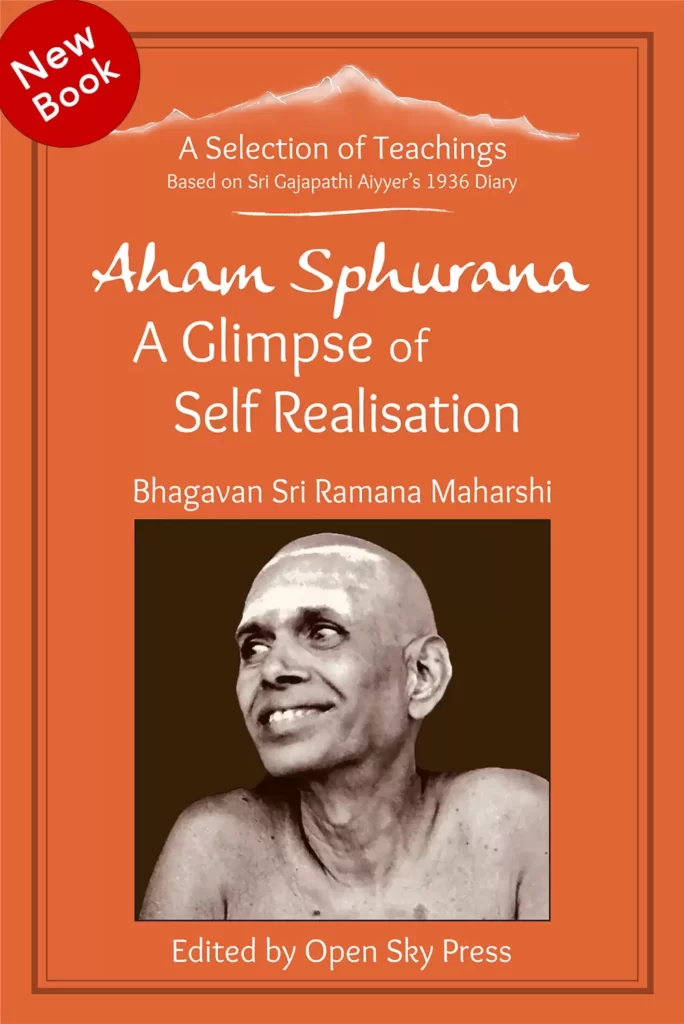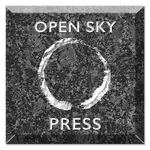
Aham Sphurana
A Glimpse of Self Realisation
New Book about Sri Ramana Maharshi

Available Worldwide
On www.openskypress.com and Amazon:

“In my opinion, Aham Sphurana, a Glimpse of Self Realisation, will become a Treasure Trove of Wisdom to the Seekers of Truth in general, and particularly to the devotees of Bhagavan.”
Swami Hamsananda – Athithi Ashram, Tiruvannamalai
Mrs Piggot’s Diary
I was told that the Maharshi had his finger on the pulse of the whole ashram, although he appeared prima facie totally unconcerned with all mundane affairs. For instance, when in the Hall, he was supposed to know what was going on even in the kitchen — and incidentally I was surprised to find that he himself assisted in the cutting up ofvegetables for the daily meal.
I was also told that he knows what is passing in the minds of people. Of this latter ability, I had a small personal experience. It was in the afternoon, and I was in the far corner of the Hall reading the translation of a collection of aphorisms written in— so it appeared to me — a flowery and artificial vein. I was bored and slightly irritated.
Suddenly one of the devotees stood before me with another book in his hand — all the ashram books were bound in brown paper and looked exactly alike — and said, ‘Bhagavan asks me to give you this. He thinks it will be more sympathetic to your type of mind.’ It was!
How could Bhagavan know what I was reading? I was sitting far away, with many people in between us, blocking his line of vision. But I had previously noticed that many times he would answer a question in my mind whilst it was only in the process of being formulated. This happened too often to be a coincidence.
Q.: Sometimes I feel thought stopping and the feeling of beingness underneath is exposed and revealed. At the same time a pulsating sensation is felt on the right-hand side of the chest. Is it right?
B.: Yes. Thoughts must cease and reason disappear for ‘I-I’ to rise up and be felt. Feeling is the prime factor and not reason.
Q.: Why should it be felt in the chest but not in the head?
B.: Because body-consciousness is located there.
Q.: When I see outside the sensation disappears. What is to be done?
B.: It must be held on to incessantly.
Q.: If one is active in the world whilst holding on to such sensation, will his actions be always right?
B.: They ought to be. However, such a person is not concerned with the right or wrong of his actions. Such a person’s actions are God’s and therefore they must be right.
Q .: Why then are the restrictions of food given for such persons also?
B.: Your present experience is due to the influence of the physical atmosphere you presently find yourself in. Can you have it outside this atmosphere? Now in you the experience is spasmodic. Until it becomes permanent, practice is necessary. Restrictions of food are aids for such experience to be repeated. After one gets established in Truth the restrictions drop away naturally. Moreover, foodinfluences the mind and for this reason the same must be kept pure.
Every experience has to end and the last day of my visit to the
ashram arrived, and with it a great sadness filled my heart. I must go back to worries, problems and irritations. Here all was peace. Here it was comparatively easy to live in the mood of the spirit. Is this why so many holy people retire to solitude, I wondered.
I had my farewell talk with Bhagavan. He was so gentle and human. We discussed thedifficulties of everyday life and mundane problems. I asked again about the relation of the body to the ‘I’. He gave this simile:
“You came up from the bungalow this morning in a cart. Yet you do not say, “The cart came up.” You say, “I came up.” You did not make the mistake of identifying yourself with the cart. In the same way, look upon your body as you do the cart. Treat it well, and it will be a good servant and instrument. But do not be deceived into thinking that it is ‘I’.”
He again stressed the necessity to see only the Self in everything.
“Act automatically, so to speak, and let ‘It’ do the work. And ‘It’ always will. Do not look for results. Do what is right at any given moment and leave it behind you then and there.”
At the end of our talk, he quoted that wonderful saying from the Upanishad:
‘When a man understands that he is the Self and therefore that he has himself become all things, what sorrow, what trouble can there be, to him who has once beheld this unity?’
As I went to say goodbye in the evening the ashram people clustered round in sympathy for my departure. I felt I had made and was leaving true friends. They were so simple and yet so genuine. There was a service taking place in the adjoining temple and an old Sanskrit hymn was being chanted. Just as I stepped into the cart the temple bell rang. This brought a smile of happiness on everyone’s face. Apparently, to hear a temple gong in the act of departure is a wonderful omen and brings peace. As I left Tiruvannamalai in the dawn of the next morning, I caught a last glimpse of Arunachala, the Holy Mountain, on which lives one of the saints of earth. It was red and glowing in the rising sun. I wept with joy to behold the sight.
Edited by John David Oct 2021







